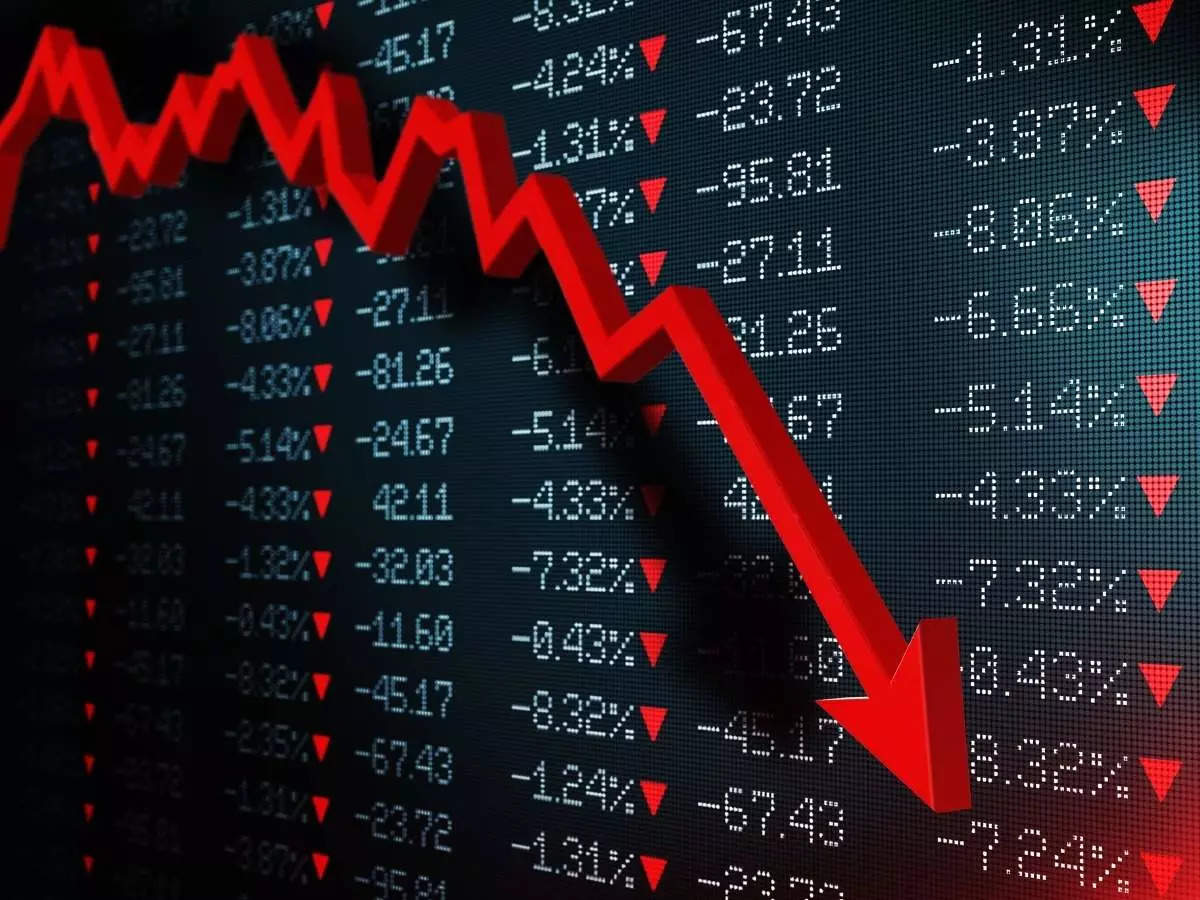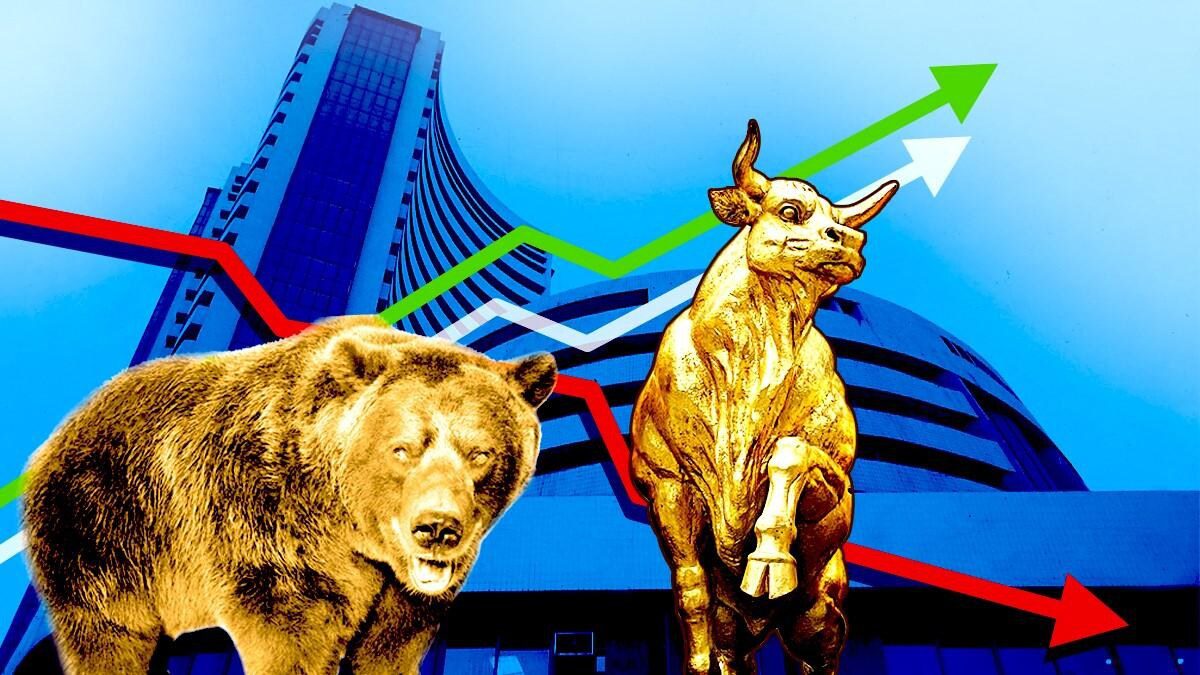Indian Stock Market Crash: March 2024 and Beyond

The Indian stock market witnessed a significant correction in March 2024, leaving many investors concerned. This blog dives deep into the crash, explores potential future behavior, and offers insights on navigating the market.
Indian Stock Market Crash: A Perfect Storm
Several factors converged to trigger the March 2024 stock market crash in India. Here’s a breakdown of the key culprits:
- Global Sell-Off: A global risk-off sentiment triggered by rising interest rates in the US and geopolitical tensions caused a domino effect, leading to selling pressure in India.
- Inflation Woes: Stubbornly high inflation in India eroded investor confidence and dampened corporate earnings expectations.
- FII Outflows: Foreign Institutional Investors (FIIs) pulled out funds from the Indian markets, seeking safer havens for their investments.
- Valuation Concerns: After a prolonged bull run, some sectors of the Indian market were perceived as overvalued, making them vulnerable to correction.
Stock Market Crash: Impact and Repercussions
The March crash caused a ripple effect across the Indian financial landscape:
- Investor Losses: Many investors, both retail and institutional, suffered significant losses as stock prices plummeted.
- Market Volatility: The crash led to increased volatility in the stock market, creating uncertainty for investors.
- Economic Slowdown Concerns: The crash fueled worries about a potential slowdown in the Indian economy.

Stock Market Future: Will the Recovery Be Swift?
Predicting the exact trajectory of the stock market is always challenging. However, here are some factors that could influence its future behavior:
- Global Cues: The global economic climate and central bank policies will significantly impact the Indian market.
- Inflation Control: The government’s effectiveness in curbing inflation will be crucial for restoring investor confidence.
- Corporate Earnings: The performance of Indian companies and their future earnings forecasts will influence investor decisions.
- Domestic Liquidity: The availability of domestic liquidity in the Indian market will play a role in driving recovery.
Best Stocks in India for March 2024 (and Beyond): A Cautious Approach
While pinpointing the “best” stocks during a volatile period is tricky, here’s some guidance for navigating the market:
- Focus on Fundamentals: Prioritize companies with strong financials, healthy balance sheets, and consistent growth prospects.
- Consider Defensive Sectors: Look into sectors less susceptible to economic downturns, like FMCG (Fast Moving Consumer Goods) or healthcare.
- Invest for the Long Term: Don’t chase short-term gains. Invest in companies with a solid long-term vision.
- Stay Diversified: Diversify your portfolio across sectors and asset classes to mitigate risk.
Beyond the Crash: Building a Resilient Investment Strategy
The March 2024 crash serves as a reminder of the inherent volatility of the stock market. Here are some tips for building a resilient investment strategy:
- Invest Regularly: Adopt a Systematic Investment Plan (SIP) to rupee-cost average and ride out market fluctuations.
- Maintain an Emergency Fund: Have a safety net to avoid forced selling during market downturns.
- Do Your Research: Invest in companies you understand and whose business models you believe in.
- Seek Professional Advice: Consider consulting a registered financial advisor for personalized guidance.
Best Stocks in India for 2024: Research is Key
While it’s impossible to predict the absolute best performers, some sectors might offer promising opportunities in 2024:
- Information Technology (IT): The IT sector in India remains a major driver of the economy and could benefit from continued digital adoption.
- Infrastructure: Government focus on infrastructure development could present opportunities in related sectors like construction and capital goods.
- Renewable Energy: India’s push for clean energy could benefit companies involved in renewable energy generation and equipment manufacturing.
Remember: Extensive research is crucial before investing in any stock. Don’t rely solely on blog posts or recommendations. Conduct your own due diligence and understand the risks involved.
Indian Stock Market Crash: A Learning Experience
The March 2024 crash serves as a valuable learning experience for Indian investors. By understanding the factors that led to the crash, investors can make informed decisions moving forward. This blog post aimed to equip you with knowledge and resources to navigate the Indian stock market effectively, even during turbulent times.
Indian Stock Market Crash: A Deep Dive and Future Outlook
Building upon the previous section, let’s delve deeper into the recent Indian stock market crash and explore potential scenarios for the coming months. This extended section will provide additional insights and actionable advice for investors navigating this dynamic landscape.
Anatomy of the Crash: A Closer Look at Triggering Factors
The March 2024 crash wasn’t a singular event. It stemmed from a confluence of internal and external factors that pressured the market:
- Global Monetary Tightening: The US Federal Reserve’s aggressive interest rate hikes to combat inflation triggered a global risk-off sentiment. Investors pulled funds from emerging markets like India, seeking safer havens in developed economies with perceived lower risks.
- Geopolitical Tensions: The ongoing geopolitical tensions around the world, particularly the ongoing conflict between Russia and Ukraine, created uncertainty and dampened investor appetite for riskier assets like equities.
- Rising Inflation in India: Stubbornly high inflation in India eroded investor confidence. Inflationary pressures squeezed corporate profit margins and raised concerns about future earnings growth.
- Expensive Valuations: After a prolonged bull run, some sectors of the Indian market, particularly technology and growth stocks, were perceived as overvalued. This made them more vulnerable to corrections when negative sentiments prevailed.
- FII Outflows and Domestic Liquidity Concerns: Foreign Institutional Investors (FIIs), who had been major contributors to the Indian stock market rally, started pulling out funds seeking stability in established markets. This outflow of foreign capital, coupled with concerns about domestic liquidity drying up, added further pressure on stock prices.
Beyond the Headlines: Potential Long-Term Implications
The immediate impact of the crash was evident in falling stock prices and increased market volatility. However, the long-term consequences might be more nuanced:
- Impact on Economic Growth: A sustained market downturn could dampen investor confidence and business sentiment, potentially impacting economic growth.
- Corporate Earnings and Investment Activity: Reduced access to capital due to the crash could hinder corporate expansion plans and impact future earnings.
- Potential for Bargain Hunting: The correction might present opportunities for long-term investors to enter the market at attractive valuations.
- Government’s Role in Market Stabilization: The Indian government’s policies and interventions aimed at reviving investor confidence and economic activity will play a crucial role in shaping the market’s trajectory.
Navigating Volatility: Investor Strategies for Uncertain Times
The stock market is inherently volatile, and the March crash serves as a stark reminder. Here are some strategies for investors to navigate uncertain times:
- Maintain a Long-Term Perspective: Don’t panic and make impulsive decisions based on short-term market fluctuations. Invest with a long-term horizon, focusing on companies with solid fundamentals and growth potential.
- Stay Disciplined with SIPs: Systematic Investment Plans (SIPs) allow you to invest a fixed amount regularly, rupee-cost averaging your investment and mitigating the impact of market volatility.
- Rebalance Your Portfolio: Regularly review your portfolio allocation and rebalance it as needed to maintain your desired risk profile. Consider increasing exposure to defensive sectors during volatile periods.
- Invest in Quality Over Price: Don’t get enticed by bargain-basement stocks solely based on their low price. Focus on companies with strong financials, healthy management, and sustainable business models.
- Diversification is Key: Diversify your portfolio across sectors, asset classes, and market capitalizations to minimize risk. Don’t put all your eggs in one basket.
- Stay Informed but Avoid Information Overload: Keep yourself updated on relevant financial news, but avoid getting overwhelmed by information overload. Stick to reliable sources and conduct your own research before making investment decisions.
Beyond Equities: Exploring Alternative Investment Avenues
The stock market crash shouldn’t deter you from building your wealth. Here are some alternative investment avenues to consider:
- Fixed Deposits (FDs): FDs offer a predetermined rate of return and are a good option for risk-averse investors seeking stable income.
- Debt Funds: Debt funds invest in government and corporate bonds, offering a mix of income and capital appreciation with lower volatility compared to equities.
- Gold: Gold is traditionally considered a safe-haven asset during market downturns. Investing in physical gold or gold ETFs can provide some hedge against inflation and market volatility.
- Real Estate: While the real estate market also experiences cycles, it can offer long-term capital appreciation and rental income potential. However, real estate investment requires a significant initial investment and ongoing maintenance costs.
- Peer-to-Peer (P2P) Lending: P2P lending platforms allow you to invest directly in loans offered to businesses or individuals, potentially earning higher returns than traditional investment options. However, P2P lending also carries higher risks of defaults.
Predicting the exact trajectory of the Indian stock market is akin to gazing into a crystal ball. However, by understanding the current landscape and analyzing past trends, we can explore some potential scenarios for the coming months:
Scenario 1: A Swift Rebound
- Global risk aversion subsides, and geopolitical tensions ease.
- The US Federal Reserve adopts a more dovish stance on interest rates.
- Inflation in India shows signs of cooling down.
- Positive corporate earnings reports boost investor confidence.
- Domestic liquidity conditions improve.
Outcome: A swift rebound in the stock market, with key indices potentially regaining lost ground within a few months. This scenario, however, hinges on favorable developments on the global and domestic fronts.
Scenario 2: A Gradual Recovery
- Global uncertainties persist, but with less intensity compared to the initial crash phase.
- The pace of interest rate hikes slows down.
- Inflationary pressures gradually ease in India.
- Corporate earnings remain moderate, but show signs of improvement.
- Domestic liquidity situation stabilizes.
Outcome: A gradual recovery in the stock market, with indices experiencing upward trends but with potential pauses and corrections along the way. This scenario reflects a more realistic expectation, where the market takes time to heal and regain momentum.
Scenario 3: A Prolonged Downturn
- Global economic slowdown materializes due to persistent geopolitical tensions and high inflation.
- Aggressive interest rate hikes continue, impacting corporate earnings.
- Domestic liquidity issues worsen, hindering investment activity.
Outcome: A prolonged period of market volatility and downward pressure on stock prices. This scenario, although less likely, highlights the importance of being prepared for various possibilities.
Investor Action Plan for Different Scenarios
Regardless of the specific scenario that unfolds, here’s how investors can adapt their strategies:
- Swift Rebound: Remain invested and potentially consider increasing exposure to sectors that benefit from the upswing.
- Gradual Recovery: Maintain a long-term perspective, rebalance your portfolio as needed, and look for opportunities to invest in quality companies at attractive valuations.
- Prolonged Downturn: Focus on risk management, prioritize portfolio safety, and consider increasing exposure to defensive sectors and fixed-income instruments.
The Importance of Active Management and Continuous Learning
The Indian stock market crash of March 2024 underscores the importance of active portfolio management and continuous learning:
- Actively Monitor Your Portfolio: Regularly assess your investments, adjust your asset allocation as needed, and stay informed about market developments.
- Seek Professional Guidance: Consider consulting a registered financial advisor who can provide personalized advice based on your risk tolerance and financial goals.
- Stay Updated on Financial Knowledge: Continuously educate yourself about the financial markets, investment strategies, and economic trends.

Conclusion: Embracing Resilience in the Stock Market
Stock market crashes are an inevitable part of the investment journey. The March 2024 crash serves as a valuable learning experience, reminding investors of the importance of a long-term perspective, prudent risk management, and a diversified portfolio. By staying informed, adopting a disciplined approach, and adapting your strategies to changing market conditions, you can build resilience and navigate the ups and downs of the stock market to achieve your long-term financial goals.
Remember: This blog post is for informational purposes only and should not be considered financial advice. Always conduct your own research and consult a qualified financial professional before making any investment decisions.
Stay Informed: Keep yourself updated with reliable financial news sources to stay ahead of market trends. Remember, the stock market is a dynamic entity. By staying informed and adopting a prudent investment strategy, you can position yourself for success in the long run.
Resources:
- https://www.livemint.com/market/stock-market-news/indian-stock-market-6-key-things-that-changed-for-market-overnight-gift-nifty-fii-selling-to-crude-oil-price-rally-11710379714395.html
- https://www.livemint.com/market/stock-market-news/stock-market-today-sensex-nifty-50-fall-about-1-each-why-is-indian-stock-market-falling-today-11710315410027.html
- https://timesofindia.indiatimes.com/business/india-business/stock-market-crash-today-bse-sensex-nifty50-march-13-2024-dalal-street-top-reasons-for-market-plunging/articleshow/108456228.cms
- https://www.livemint.com/market/stock-market-news/sebi-chief-flags-risk-of-bubble-in-stock-market-11710166631623.html
- https://www.bloomberg.com/news/articles/2024-03-14/an-80-billion-crash-in-india-s-small-caps-flashes-warning-signs
For more business news: https://waddupindia.in/category/business/






5 thoughts on “Comprehensive Analysis of Indian Stock Market March 2024 – Why The Crash? Best Stocks? Future and More”
Thanks for sharing. I read many of your blog posts, cool, your blog is very good.
Thank you for your sharing. I am worried that I lack creative ideas. It is your article that makes me full of hope. Thank you. But, I have a question, can you help me? https://accounts.binance.info/en-IN/register-person?ref=UM6SMJM3
Your article helped me a lot, is there any more related content? Thanks!
Can you be more specific about the content of your article? After reading it, I still have some doubts. Hope you can help me.
Thanks for sharing. I read many of your blog posts, cool, your blog is very good. https://www.binance.info/register?ref=P9L9FQKY